 Now in its eighth year, the American Booksellers Association's Winter Institute continues to be a fertile place for launching the bestsellers of the future. As Geoffrey Jennings from Rainy Day Books in Kansas City--host city of this year's Winter Institute--observed, "It would behoove people to pay attention to what books come out of the Winter Institute." At the first Winter Institute, for example, Sara Gruen's Water for Elephants broke out, and last year The One and Only Ivan by Katherine Applegate was a Winter Institute favorite--and went on to win the Newbery last month.
Now in its eighth year, the American Booksellers Association's Winter Institute continues to be a fertile place for launching the bestsellers of the future. As Geoffrey Jennings from Rainy Day Books in Kansas City--host city of this year's Winter Institute--observed, "It would behoove people to pay attention to what books come out of the Winter Institute." At the first Winter Institute, for example, Sara Gruen's Water for Elephants broke out, and last year The One and Only Ivan by Katherine Applegate was a Winter Institute favorite--and went on to win the Newbery last month.
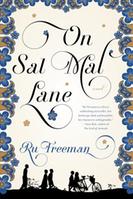 Atop bookseller fiction buzz lists going into Winter Institute 8 this coming weekend are On Sal Mal Lane by Ru Freeman (Graywolf, May) and We Need New Names by NoViolet Bulawayo (Reagan Arthur/Little, Brown, May). On Sal Mal Lane opens on a street that represents a mix of the population of Sri Lanka on the brink of civil war in the late 1970s and early 1980s. We Need New Names, a debut novel, takes place in Zimbabwe and focuses on a group of children, among them Darling, a 10-year-old from a middle-class family forced to move to a shantytown as the country falls into unrest and unbelievable brutality. They often don't have enough food but are exposed to plenty of American television. The title comes from a chapter in which the children play "ER" as they deal with a medical problem of one of their own and decide that they need names different from the TV characters. Eventually Darling leaves Zimbabwe to live with an aunt in Detroit--which, said Annie Philbrick from Bank Square Books in Mystic, Conn., gives the author license to take the book in an even deeper direction, looking at America through the immigrant girl's eyes. "I needed to put it down every once in a while," said Philbrick, who called the writing "sparse."
Atop bookseller fiction buzz lists going into Winter Institute 8 this coming weekend are On Sal Mal Lane by Ru Freeman (Graywolf, May) and We Need New Names by NoViolet Bulawayo (Reagan Arthur/Little, Brown, May). On Sal Mal Lane opens on a street that represents a mix of the population of Sri Lanka on the brink of civil war in the late 1970s and early 1980s. We Need New Names, a debut novel, takes place in Zimbabwe and focuses on a group of children, among them Darling, a 10-year-old from a middle-class family forced to move to a shantytown as the country falls into unrest and unbelievable brutality. They often don't have enough food but are exposed to plenty of American television. The title comes from a chapter in which the children play "ER" as they deal with a medical problem of one of their own and decide that they need names different from the TV characters. Eventually Darling leaves Zimbabwe to live with an aunt in Detroit--which, said Annie Philbrick from Bank Square Books in Mystic, Conn., gives the author license to take the book in an even deeper direction, looking at America through the immigrant girl's eyes. "I needed to put it down every once in a while," said Philbrick, who called the writing "sparse."
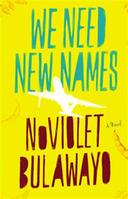
We Need New Names was "like nothing I have ever read before," said Calvin Crosby, from Book Passage in Corte Madera, Calif. Cathy Langer, book buyer at the Tattered Cover in Denver, gave both books a rave, and likened Devi, the girl at the center of On Sal Ma Lane, to Scout from To Kill a Mockingbird and Swede from Peace Like a River.
Langer called Freeman's writing "cinematic" and compared On Sal Mal Lane with Abraham Verghese's Cutting for Stone. "It's that rich and deep," she said. Freeman's previous novel, A Disobedient Girl was published in seven languages and Bulawayo's debut, We Need New Names, won the 2011 Caine Prize for African Writing.
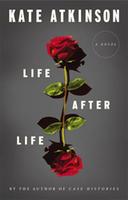 "Booker worthy": that's how Sheryl Cotleur, from Copperfield's Books in Petaluma, Calif., described another buzz favorite, Kate Atkinson's Life After Life (Reagan Arthur/Little, Brown, April). Cotleur admitted that the premise sounded a little "hokey"--it opens with the main character being stillborn and goes on to have her and others step into different versions of their same lives (one has a gun pointed at Hitler in a café)--"but the book is really well done." Gayle Shanks from Changing Hands in Tempe, Ariz., said she could not understand how Atkinson managed to keep what happens to all the characters in the various versions of their lives straight. "She did not make one mistake," Shanks said.
"Booker worthy": that's how Sheryl Cotleur, from Copperfield's Books in Petaluma, Calif., described another buzz favorite, Kate Atkinson's Life After Life (Reagan Arthur/Little, Brown, April). Cotleur admitted that the premise sounded a little "hokey"--it opens with the main character being stillborn and goes on to have her and others step into different versions of their same lives (one has a gun pointed at Hitler in a café)--"but the book is really well done." Gayle Shanks from Changing Hands in Tempe, Ariz., said she could not understand how Atkinson managed to keep what happens to all the characters in the various versions of their lives straight. "She did not make one mistake," Shanks said.
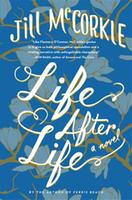 This will be confusing, but there's another book being promoted at Winter Institute with the title Life After Life. This one is from Algonquin (March) and is by indie favorite Jill McCorkle. It features a cast of incredible characters who occupy the Pine Heaven Retirement Center. "If I ever have to live in a retirement home, this is the kind of place I want to live in," said Philbrick.
This will be confusing, but there's another book being promoted at Winter Institute with the title Life After Life. This one is from Algonquin (March) and is by indie favorite Jill McCorkle. It features a cast of incredible characters who occupy the Pine Heaven Retirement Center. "If I ever have to live in a retirement home, this is the kind of place I want to live in," said Philbrick.
To add to the confusion--or confluence of great writing--both novels titled Life After Life will share the top spot for the Indie Next Pick in April.
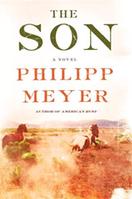 Many booksellers look for books that likely will take their writers to new prominence, and this year Mark Slouka (known for Lost Lake) and Philipp Meyer (who wrote American Rust) fit that bill. "It's Lonesome Dove meets Cormac McCarthy," said Mitchell Kaplan, from Books & Books, Coral Gables, Fla., about Meyer's The Son (Ecco, May), which deals with the founding of Texas as observed by many people across generations.
Many booksellers look for books that likely will take their writers to new prominence, and this year Mark Slouka (known for Lost Lake) and Philipp Meyer (who wrote American Rust) fit that bill. "It's Lonesome Dove meets Cormac McCarthy," said Mitchell Kaplan, from Books & Books, Coral Gables, Fla., about Meyer's The Son (Ecco, May), which deals with the founding of Texas as observed by many people across generations.  Slouka's Brewster (Norton, Aug.) is about two boys growing up in upstate New York on the cusp of the Vietnam War. The Tattered Cover's Langer--who was a teenager during that time--said she had flashbacks about a boyfriend who was getting his draft number. "At first I thought it was a guy novel," Langer said, but it really gripped her.
Slouka's Brewster (Norton, Aug.) is about two boys growing up in upstate New York on the cusp of the Vietnam War. The Tattered Cover's Langer--who was a teenager during that time--said she had flashbacks about a boyfriend who was getting his draft number. "At first I thought it was a guy novel," Langer said, but it really gripped her.
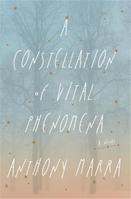 Winter Institute has also established itself as a place for debut novelists to be noticed. Among debuts on the radar this year: A Constellation of Vital Phenomena by Anthony Marra (Hogarth, May), The Blood of Heaven by Kent Wascom (Grove, June), Norwegian by Night by Derek B. Miller (Houghton Mifflin, May), The Golem and the Jinni by Helene Wecker (Harper, April) and The Unchangeable Spots of Leopards by Kristopher Jansma (Viking, March).
Winter Institute has also established itself as a place for debut novelists to be noticed. Among debuts on the radar this year: A Constellation of Vital Phenomena by Anthony Marra (Hogarth, May), The Blood of Heaven by Kent Wascom (Grove, June), Norwegian by Night by Derek B. Miller (Houghton Mifflin, May), The Golem and the Jinni by Helene Wecker (Harper, April) and The Unchangeable Spots of Leopards by Kristopher Jansma (Viking, March).
Bill Cusumano from Nicola's in Ann Arbor, Mich., called Marra's A Constellation of Vital Phenomena "just outstanding. He writes a narrative that is far beyond a first novel." The gritty novel, set in Chechnya between Russia's occupations, focuses on a "little pocket of humanity" among a society torn on all sides and riddled with thieves, Cusumano said. 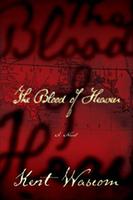 And he called The Blood of Heaven "fierce"--that novel is set in the early days of the U.S. and involves the conspiracy by Aaron Burr possibly to set himself up as head of state in an independent country in the West or Mexico. "I will be very careful who I handsell that one to," said Cusumano.
And he called The Blood of Heaven "fierce"--that novel is set in the early days of the U.S. and involves the conspiracy by Aaron Burr possibly to set himself up as head of state in an independent country in the West or Mexico. "I will be very careful who I handsell that one to," said Cusumano.
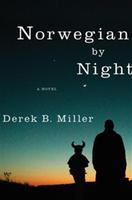 For Norwegian by Night--which takes place in Norway, where a former marine sniper in Korea settles with his granddaughter and her new husband--Houghton's tagline is: "a literary novel, a thriller and the funniest book you will ever read about war crimes and dementia." As Bank Square's Philbrick said: "What can go wrong with that? And it even has the word 'Norwegian' in the title."
For Norwegian by Night--which takes place in Norway, where a former marine sniper in Korea settles with his granddaughter and her new husband--Houghton's tagline is: "a literary novel, a thriller and the funniest book you will ever read about war crimes and dementia." As Bank Square's Philbrick said: "What can go wrong with that? And it even has the word 'Norwegian' in the title."
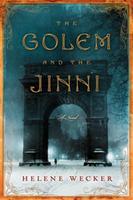 The Golem and the Jinni is about two supernatural beings who befriend each other in 1899 New York, and The Unchangeable Spots of Leopards is a contemporary novel about two male writers from very different backgrounds who meet in college and vie for the attention of the same outlandish young woman. Noting that readers do not always want to read dark fiction, Jennings though both of these titles might have more mainstream appeal than the debut novels with heavier premises.
The Golem and the Jinni is about two supernatural beings who befriend each other in 1899 New York, and The Unchangeable Spots of Leopards is a contemporary novel about two male writers from very different backgrounds who meet in college and vie for the attention of the same outlandish young woman. Noting that readers do not always want to read dark fiction, Jennings though both of these titles might have more mainstream appeal than the debut novels with heavier premises.
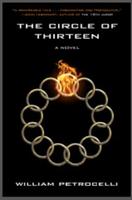
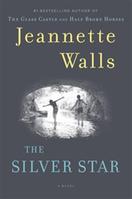 Among authors attending Wi8 with new novels are: Jeannette Walls (The Silver Star, Scribner, June), Curtis Sittenfeld (Sisterland, Random House, June), Christina Schwarz (The Edge of the Earth, Atria, April) Cathleen Schine (Fin and Lady, Sara Crichton/FSG, July), Ann Hood (The Obituary Writer, Norton, Feb.), Ruth Ozeki (A Tale for the Time Being, Viking, March) and Gail Godwin (Flora, Bloomsbury, May).
Among authors attending Wi8 with new novels are: Jeannette Walls (The Silver Star, Scribner, June), Curtis Sittenfeld (Sisterland, Random House, June), Christina Schwarz (The Edge of the Earth, Atria, April) Cathleen Schine (Fin and Lady, Sara Crichton/FSG, July), Ann Hood (The Obituary Writer, Norton, Feb.), Ruth Ozeki (A Tale for the Time Being, Viking, March) and Gail Godwin (Flora, Bloomsbury, May).
Jennings predicted that the new Ozeki will "go nuclear"; Walls's book will make her a brand name ("if she isn't one already"); and Hood's novel will be "pretty reliable for us." Valerie Koehler from Blue Willow Bookshop in Houston called Schwartz's Edge of the Earth "good, solid historical fiction."
Tomorrow: check out the buzz from indie presses, selected sleepers and nonfiction. And on Thursday we take a look at YA and children's authors at Winter Institute 8. --Bridget Kinsella
Corrected: An earlier version of this story misquoted Cathy Langer in regard to the character Devi in On Sal Mal Lane.

